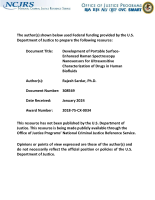Law Enforcement Community
Structuring Justice: How Prosecutorial Offices Handle Hate Crime Detection and Prosecution
Characteristics of officer-involved vehicle collisions in California
Labor Trafficking in Construction and Hospitality Survey Findings: Chicago
The Impact of a Brief and Immersive Use-of-force Training Exercise on Citizens' Attitudes Toward Police
Criminal Justice Technology Adoption and Implementation Guide
Latent Fingerprint Matching: Fusion of Rolled and Plain Fingerprints
Labor Trafficking in Construction and Hospitality Survey Findings: New York
Community Responses to Drug Abuse: A Program Evaluation
Police Drug Crackdowns: An Evaluation of Implementation and Effects
Labor Trafficking in Construction and Hospitality Survey Findings: Summit County
Labor Trafficking in Construction and Hospitality Survey Findings: Denver
Labor Trafficking in Construction and Hospitality Topical Brief: Immigrant Workers
Labor Trafficking in Construction and Hospitality Topical Brief: Barriers to Help-Seeking
Using Data Governance and Data Management in Law Enforcement Building a Research Agenda That Includes Strategy, Implementation, and Needs for Innovation
FBI Subaward to the NIST project "Identifying Class and Individual Characteristics of Printer Marks on Additively Manufactured Firearm Components"
Advancing Justice for the Missing and Unidentified Through Research - 2024 NIJ Research Conference
Forensic science research is developing essential knowledge to fill in the holes in death investigations, creating new ways to identify challenging skeletal remains. These methods inform cause of death, time of death, and familial relationships to guide investigations, identify suspects, support prosecutions, and bring justice to families.
See the YouTube Terms of Service and Google Privacy Policy
Celebrating 10 Years of NIJ’s Law Enforcement Advancing Data and Science (LEADS) Scholars Program - 2024 NIJ Research Conference
In 2014, NIJ established the Law Enforcement Advancing Data and Science (LEADS) Scholars Program to support research-minded, mid-career sworn law enforcement officers working to integrate research into agency policy and practice. The LEADS Scholars Program helps participants develop independent research and provides support to identify current evidence on priority issues.
See the YouTube Terms of Service and Google Privacy Policy



